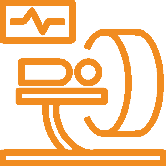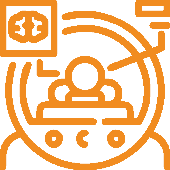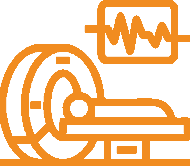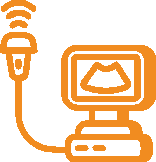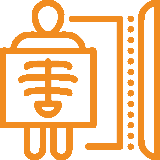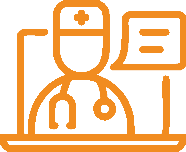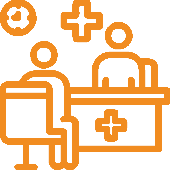CT Scan
Sun Radiology
Radiologist, Neuroradiologist, and Musculoskeletal Radiologist in Glendale, AZ; Peoria, AZ; & Phoenix, AZ
CT scans create detailed images of the inside of your body in a painless, non-invasive procedure. Manntej Sra, MD, a board-certified radiologist, and the team of experts at Sun Radiology offer cutting-edge 64-slice and 128-channel CT scanners. They have four convenient locations in Peoria, Phoenix, and Glendale, Arizona. Call your nearest office today or schedule an appointment online if you need a CT scan.
PREPARING FOR YOUR CT EXAM
Hello! You have been scheduled for a CT exam at our facility. Please read the following information carefully, as it contains important instructions for your exam.
Your exam may be ordered with or without IV contrast. If you are having a CT exam of the abdomen or pelvis, you may need oral contrast also. At the time of scheduling, we will go over your exam type and give you special instructions based on the type of exam and contrast ordered.
Instructions for Oral Contrast
You can either pick the oral contrast ahead of time and start drinking it per instructions before arriving for your appointment OR you can come 2 hours ahead of your appointment time and start drinking the oral contrast at the facility.
- Do not eat or drink anything except water 4 hours before your appointment time.
- Shake the contrast well before drinking. It does not need to be refrigerated but it tastes better when cold.
- Begin drinking the contrast 2 hours before your scheduled exam time.
- Drink 1/3 of a bottle every fifteen minutes.
- Save the last third and bring it with you to your appointment and drink the last third at the facility.
- It is important to follow the instructions carefully so that the contrast can fill your whole intestine for good-quality images.
Instructions for IV Contrast:
Please let us know if you have an allergy to Iodine or have had a prior allergic reaction to IV contrast during your previous CT exam. It is important to know what type of allergic reaction you had . The reaction may be considered mild if it was a rash or hives. In this type of mild reaction, we can pre-medicate you with Benadryl or prednisone. If you decide to take Benadryl before the exam, ensure you have a designated driver to drive you to your appointment. Benadryl will make you feel drowsy and you should not be driving or operating heavy equipment after taking this medication.
If you have a severe allergy to Iodine, then you will not be a candidate for the IV contrast study. A severe reaction would entail shortness of breath or an anaphylactic reaction.
Labs for the Exam ordered with IV Contrast
Renal (kidney) function labs are required for IV contrast. The IV contrast is flushed through your kidneys and it is important to make sure that you have good kidney function to get rid of the contrast from your body. If your GFR (kidney function lab) is less than 30 ml/min, contact your primary care doctor to make sure it is safe for you to have the IV contrast. The labs required are BUN/CREAT and GFR. These labs must be within the last 90 days.
Labs are needed if you:
- Are above the age of 60.
- Have a history of kidney disease, on dialysis, kidney transplant, kidney, Kidney surgery, cancer of the kidney, low kidney function.
- Have a history of diabetes.
- Have a history of hypertension and you are on blood pressure medications.
- If you have not had any labs in the last 90 days, please contact your primary care physician for a lab order.
- Please bring a copy of your lab results with you to appointment or fax to 623-815-8299.
Eating and drinking fluids before the exam:
- Drink lots of water a day before and after the test is completed. This will ensure that the contrast material is flushed out of your system quickly. Staying well hydrated also makes it easier to find your veins for IV access to give you IV contrast.
- Try to avoid drinks other than water.
- Do not eat four hours before your exam, if it is ordered with contrast-oral or IV.
Taking Medications:
- You can take your medications as prescribed by your doctor on the day of your exam.
- If you are taking insulin, check your blood sugar in the morning and adjust your dose accordingly.
Pregnancy and Breast Feeding:
CT exam is not safe during pregnancy. If you suspect that you may be pregnant, please take a urine pregnancy test before the exam. If the test is positive, you will have to cancel the CT exam and consult with your referring doctor or primary care physician.
Breast Feeding: Contrast given during the CT exam can alter the taste of breast milk . Avoid breastfeeding for 24 hours after the contrast administration. Express the breast milk from both breasts and discard the milk for 24 hours after the contrast administration. You can resume breastfeeding after 24 hours. You may pump the breast milk before the exam and feed the baby in the first 24 hours after contrast administration.
ALLERGIC REACTION AFTER CONTRAST
If you have a mild allergic reaction like rash or hives, contact us at 623-815-8200 or contact your primary care physician.If you have severe allergic reactions like shortness of breath, tightness in your throat, or anaphylactic reaction-call 911. Contact your primary care physician If you experience a problem in the area of injection like redness, swelling, fever, or pain. If your symptoms get worse, go to the ER for immediate attention. You can use a warm towel If there is mild swelling or soreness.
CT Scan Q & A
CT (computer-aided tomography) scans combine X-rays with computer technology to create detailed images of the inside of your body.
Instead of creating one image like a traditional X-ray, a CT scan takes multiple images as the machine rotates around your body.
While each X-ray shows a “slice” of the inside of your body, the CT computer can stack those slices to create a 3D representation of nearly any part of your body.
Sun Radiology has 64 slice/128-channel CT equipment that creates remarkably detailed images, including brain, lungs, abdomen, pelvis, spine, cardiac, angiogram, and neuroimaging.
While a traditional CT scan may have only produced 4- or 16-slice images, Sun Radiology invests in the best emerging digital imaging technology to provide you with a rapid, accurate diagnosis.
CT scans provide detailed images of almost every part of your body and have a multitude of uses.
For example, your doctor may order a CT scan for headaches, back pain, abdominal, or pelvic pain to identify masses or tumours in your abdomen, study your cardiovascular system for chest pain, or examine your head and brain for signs of tumors and blood clots.
Your doctor may request a CT scan to study your lungs if they suspect you have a tumor, pulmonary embolism, or conditions like emphysema or pneumonia.
You may also need a CT scan to diagnose complex bone fractures or severely arthritic or eroded joints. CT scans can also reveal bone tumors.
You usually change into a hospital gown and remove all jewelry, eyeglasses, and hearing aids for a CT scan. You may need to fast for several hours before your scan if you need a contrast dye injection.
During your CT scan, you lie on a table and stay as still as possible as it moves through the CT machine. The machine rotates around you, taking multiple digital X-rays. You may need to hold your breath for a few seconds to ensure the device creates clear images.
Your CT technician operates the machine from a neighboring room. They can see you through a glass panel and can talk to you throughout your scan.
While CT scans are safe, you should let your radiologist know if you’re pregnant, breastfeeding, or have thyroid or kidney disease.
Call Sun Radiology or schedule an appointment online for state-of-the-art CT scans.

